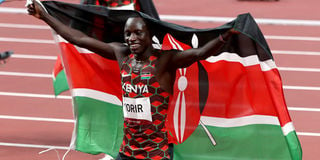Emmanuel Korir: From dusty Iten track to Olympic gold medal

Kenya's Emmanuel Kipkurui Korir celebrates winning the gold medal in the men's 800m final during the athletics event at the Tokyo 2020 Olympic Games at Olympic Stadium in Tokyo, Japan.
What you need to know:
- And, indeed, when Australia’s Peter Bol controlled the race, crossing the 400-metre mark at 53.8 seconds, and 600m at 1:19.7, Korir took over, crossing the 700-metre mark in first place at 1:32.3 before blasting past the finish line in 1:45.06 for the eagerly-awaited gold.
- Ereng’s protégé has, finally, graduated to be his own man. And like his coach, and Olympic champion.
In Tokyo
Five years ago, Emmanuel Korir – winner of Kenya’s first gold medal of the Tokyo Olympics - was an ordinary village boy, excited to run on dirt trails alongside star athletes in the Bro Colm O’Connell Iten track and field production line.
The famous Irish missionary is credited with having developed a galaxy of star athletes including double Olympic champion and world 800 metres record holder David Rudisha.
In 2016, having taken up coaching in the USA collegiate system after a brilliant track career that saw him win gold at the 1988 Olympic Games in Seoul, South Korea, Starehe Boys Centre alumnus Paul Ereng happened by Iten on a scouting mission and spotted Korir.
“He had run one minute, 46.2 seconds, but I was more interested in his academics,” Ereng narrated on telephone Wednesday night as he celebrated his protégé Korir’s gold.
“I had never recruited a 1:46 athlete. I usually took 1:50 athletes and turned them round to be good runners but for Korir, I knew straight away I could take him up immediately to another level,” Ereng, track and field coach at the University of Texas at El Paso (UTEP), said.
Ereng then took Korir to UTEP in August, 2016, laid his athletics basis that fall and started to work on specific 800m training.
“He had injuries but still won the indoor collegiate nationals which usually run at the end of the indoor season.”
Korir, 26, responded well in 2017, running the fastest indoor 600m race of all time at the Cherry & Silver Collegiate Invitational in Albuquerque, New Mexico, a blistering 1:14.97.
Then he shifted focus to the 400 metres.
“He surprised us at a small meeting in college. We saw him run the final curve onto the final straight and when the scoreboard flashed 44.69, the stadium went wild!” Ereng recalls.
Korir would then pace himself to 1:43.72 at a race in California, the rest of the field operating around 1:50.
“And that was when I knew Emmanuel was born and would be great,” Ereng reflects.
A decent 2017 season saw him break school and meet records in the 400m (44.67 seconds), clocking 1:43.73 in the 800m, joining the rare league of athletes who have run sub 45 seconds and sub 1:44 in the 400m and 800m at the same time.
The others are: Cuba’s Alberto Juantorena (1:43.5 and 44:26 in the 400m world record run back in 1976) and USA’s Mark Everett (44:45 and 1:43:20).
Back problems meant that he endured a horrible 2017 World Athletics Championships in London.
It was distressing.
“I took him back to USA for therapy and to get him back to a position where he could be strong again.”
In 2018, Korir bounced back and was healthy completing a full season and even competing at the African Championships in Asaba, Nigeria, where a faulty start gun left him on the starting line as the rest of the field took off, with no restart called.
And just as he was preparing for the 2019 World Championships in Doha, Korir suffered an accident that sidelined him before he made quick recovery.
Last year, Korir was in top shape but then the Olympic Games were postponed due to the coronavirus pandemic.
Ereng isn’t here for the Tokyo Olympics, but he has been handling Korir through telephone, sending work-outs via WhatsApp to his athlete in Tokyo.
“Last night we spoke and assessed his performance in the first round and semi-finals.
“The biggest problem for both Emmanuel and Ferguson is they could not get into lane one early.
“We also spoke about how Emmanuel can use his speed as a 400-metre runner to his advantage.
“I told him he’d win if he gets into lane one early and if the race was slow, it would work to his advantage because he has the speed for the finish.”
And, indeed, when Australia’s Peter Bol controlled the race, crossing the 400-metre mark at 53.8 seconds, and 600m at 1:19.7, Korir took over, crossing the 700-metre mark in first place at 1:32.3 before blasting past the finish line in 1:45.06 for the eagerly-awaited gold.
Ereng’s protégé has, finally, graduated to be his own man. And like his coach, he's an Olympic champion.





